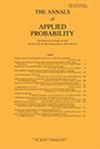具有遍历强度的多人联盟的淬灭大数定律和淬灭中心极限定理
IF 1.8
2区 数学
Q2 STATISTICS & PROBABILITY
引用次数: 1
摘要
我们提出并研究了一种新的比赛模型,特别是体育多人联盟,其中球队的初始实力是独立的i.i.d.随机变量,这些变量在联盟的不同日子里根据独立的遍历过程演变。每场比赛的结果都是随机的:一支球队战胜另一支球队的概率取决于比赛当天两队实力的函数。我们的模型推广了以前在物理和数学文献中研究的一些模型,并根据可以统计校准的不同参数进行了定义。我们证明了一个淬灭的——以团队的初始强度为条件的——大数定律,以及一个团队根据其初始强度获胜次数的淬灭中心极限定理。为了得到我们的结果,我们证明了一个独立利益定理。对于满足混合条件和独立序列的平稳过程$\neneneba xi=(\xi_i)_{i\in\mathbb{N}}$,我们证明了$\sum_{i=1}^{n}g\left(\xi_i,s_i\right)$,其中$g$是有界可测量函数。我们强调随机变量$g\left(\xi_i,s_i\right)$不是$(s_i)_{i\in\mathbb{N}}$上的平稳条件。本文章由计算机程序翻译,如有差异,请以英文原文为准。
Quenched law of large numbers and quenched central limit theorem for multiplayer leagues with ergodic strengths
We propose and study a new model for competitions, specifically sports multi-player leagues where the initial strengths of the teams are independent i.i.d. random variables that evolve during different days of the league according to independent ergodic processes. The result of each match is random: the probability that a team wins against another team is determined by a function of the strengths of the two teams in the day the match is played. Our model generalizes some previous models studied in the physical and mathematical literature and is defined in terms of different parameters that can be statistically calibrated. We prove a quenched -- conditioning on the initial strengths of the teams -- law of large numbers and a quenched central limit theorem for the number of victories of a team according to its initial strength. To obtain our results, we prove a theorem of independent interest. For a stationary process $\xi=(\xi_i)_{i\in \mathbb{N}}$ satisfying a mixing condition and an independent sequence of i.i.d. random variables $(s_i)_{i\in \mathbb{N}}$, we prove a quenched -- conditioning on $(s_i)_{i\in\mathbb{N}}$ -- central limit theorem for sums of the form $\sum_{i=1}^{n}g\left(\xi_i,s_i\right)$, where $g$ is a bounded measurable function. We highlight that the random variables $g\left(\xi_i,s_i\right)$ are not stationary conditioning on $(s_i)_{i\in\mathbb{N}}$.
求助全文
通过发布文献求助,成功后即可免费获取论文全文。
去求助
来源期刊

Annals of Applied Probability
数学-统计学与概率论
CiteScore
2.70
自引率
5.60%
发文量
108
审稿时长
6-12 weeks
期刊介绍:
The Annals of Applied Probability aims to publish research of the highest quality reflecting the varied facets of contemporary Applied Probability. Primary emphasis is placed on importance and originality.
 求助内容:
求助内容: 应助结果提醒方式:
应助结果提醒方式:


